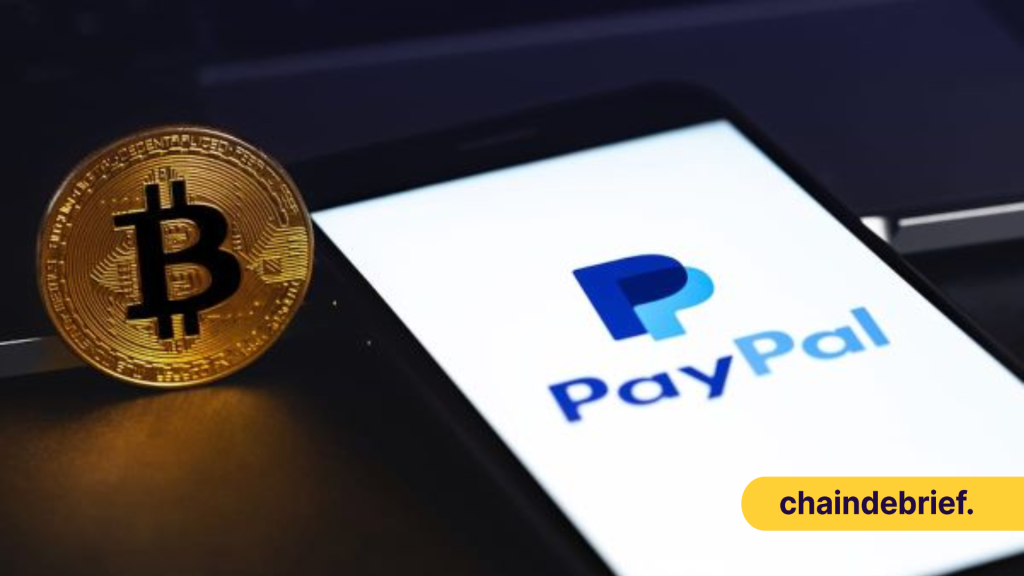As the crypto landscape starts to evolve exponentially, PayPal’s recent launch of $PYUSD marks a pivotal milestone for the mainstream adoption of cryptocurrencies.
By introducing its own stablecoin, PayPal contributes to the legitimacy of cryptocurrencies as digital payments with its arsenal of 29 million merchants and more, acting as a bridge to the traditional realm of finance. While concerns of centralization and regulatory control arose quickly in response to the news, this points to a largely positive outlook for what this can mean for the future of fintech.
Source: PayPal
What is $PYUSD?
On the 7th of August, 2023, PayPal announced the launch of its own stablecoin, PayPal USD (PYUSD). Issued by New York-based crypto financial services firm Paxos Trust, this stablecoin is an ERC-20 token that will operate on the Ethereum network, with a redemption value of 1:1 for the U.S. dollar. It is backed by a combination of U.S. dollar deposits, short-term treasuries, and similar cash equivalents.
In the coming weeks, PYUSD will be available to customers in the US with PayPal Balance accounts, offering them buying and selling options.
It is also announced that it will come to the PayPal-owned Venmo app shortly thereafter. With PYUSD, users will be able to use it for real-world purchases, transfers, and person-to-person payments. Similarly, PYUSD can be seamlessly converted to other currencies supported by PayPal, such as AUD and CAD.
Paxos 🤝 PayPal
— Paxos (@Paxos) August 7, 2023
Thrilled to be partnering with @PayPal to bring PYUSD, the world’s safest dollar-backed digital asset, to hundreds of millions of consumers and merchants worldwide.
PYUSD is the first of its kind, representing the next phase of US dollars on the blockchain. This…
The team is also looking to explore additional strategic cryptocurrency partnerships down the line, expanding its reach to broader Web3 infrastructure, such as DeFi protocols, and other applications.
The benefits it will bring to Real-World Adoption
PayPal is no stranger to the cryptocurrency industry, having first introduced crypto services back in 2020 when it began allowing customers in the U.S. to buy, hold, and sell cryptocurrencies. Given the current controversy among U.S. regulators about how to approach cryptocurrencies, this is no easy feat.
Additionally, in 2021, PayPal also announced the launch of “Checkout with Crypto,” a feature that allowed consumers to use cryptocurrencies to fund their purchases from online businesses. Consumers were also allowed to transfer cryptocurrencies between accounts, or externally to non-custodial wallets and exchanges.
The reason this PYUSD news is significant is that it symbolizes a milestone moment toward the legitimization of cryptocurrencies.
As a large fintech provider globally with a well-established reputation in traditional markets, PYUSD will act as a bridge for many more retail individuals to enter the emerging Web3 industry. Moreover, PayPal has the potential to unlock vast amounts in crypto settlement volume, with access to over 29 million merchants and cross-border digital payments.
As quoted by PayPal CEO and President, Dan Schulman:
“The shift toward digital currencies requires a stable instrument that is both digitally native and easily connected to fiat currency like the U.S. dollar. Our commitment to responsible innovation and compliance, and our track record delivering new experiences to our customers, provides the foundation necessary to contribute to the growth of digital payments through PayPal USD.”
Addressing the Centralization Concerns
The ethos of cryptocurrency is, and always has been, centered on autonomy and decentralization. Its purpose was to help empower users to reclaim their privacy and avoid control by any single entity with vested financial interests in private data—allowing for an open, transparent, and fair industry for everyone.
Regarding the launch of PayPal’s PYUSD, centralization concerns have been raised. Much like other stablecoin alternatives, such as USDC, BUSD, and USDT, PayPal can freeze and seize any user’s PYUSD assets. As pointed out by the Twitter user, @pashovkrum, in the realm of smart contract security, this is termed a ‘centralization attack vector’.
The new Paypal USD stablecoin has an "assetProtection" role which can wipe your balance in two transactions (first `freeze`, then `wipeFrozenAddress`)
— pashov (@pashovkrum) August 7, 2023
In smart contract security we call this a "centralisation attack vector" pic.twitter.com/RsmqvsnKvi
However, many replies highlighted the importance of understanding that centralized functions are necessary for a regulatory approach due to the compliance issues surrounding fiat currency.
Additionally, while there are inherent recognized dangers when using tokens representing legal obligations on public blockchains, such as confusion about what the token actually promises or represents, or the possibility of disagreements, the feature in question actually mitigates risks rather than aggravates them.
The fundamental idea of blockchains is that they are public and permissionless, and users have full non-custodial access to the assets they choose to interact with, which may or may not include $PYUSD. Ultimately, the solution to avoid conflict is simply not to use the stablecoin.
Closing Thoughts
PayPal’s introduction of PYUSD is a significant move towards encouraging mainstream cryptocurrency adoption. With an improved user experience for even the most traditional folks, decentralized finance is poised to benefit from the increased liquidity influx and consumer interest, bringing optimism for a future where cryptocurrency can integrate seamlessly with traditional financial systems.
As greater clarity builds on cryptocurrency regulations over time, both individual investors and institutions will gain increased confidence in participating in the digital currency landscape and will adopt cryptocurrency-based payment and remittance systems.
PayPal, being one of the most well-established financial payment companies worldwide, undeniably contributes to this momentum. Ultimately, the trajectory toward defined regulatory frameworks will play a pivotal role.
Author: Jowella
Also Read: Exposing BALD Coin’s $100M Rug Pull Developer:
[Editor’s Note: This article does not represent financial advice. Please do your research before investing.]
Featured Image Credit: NCFA



































